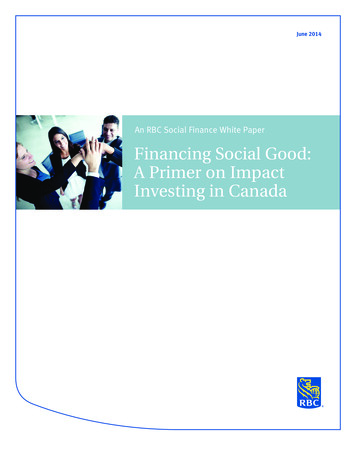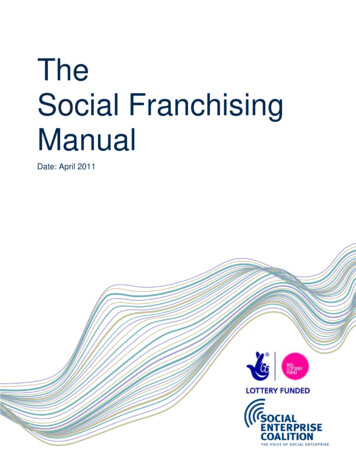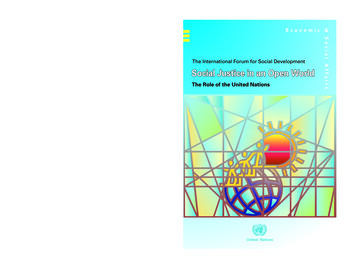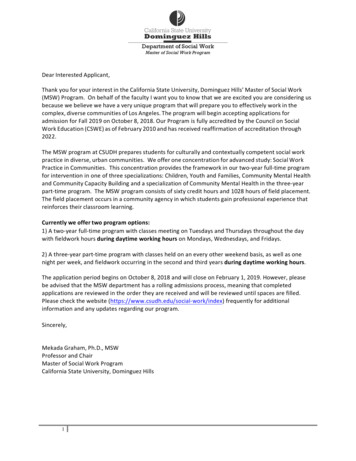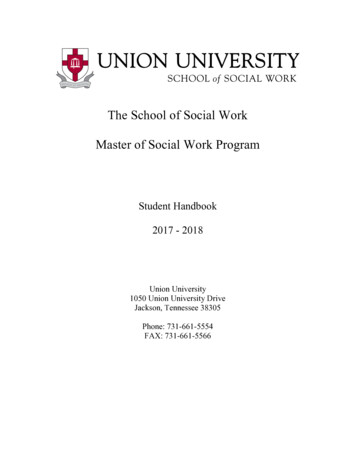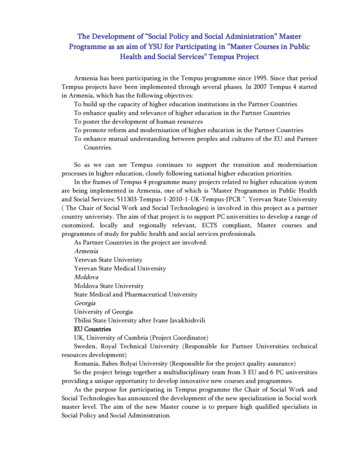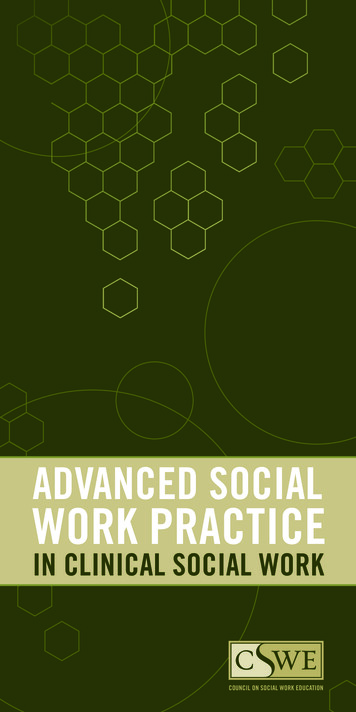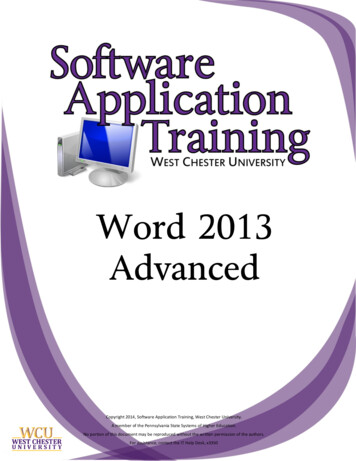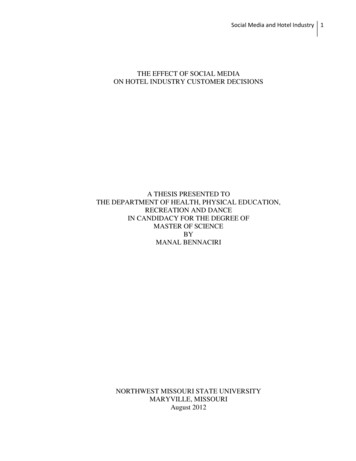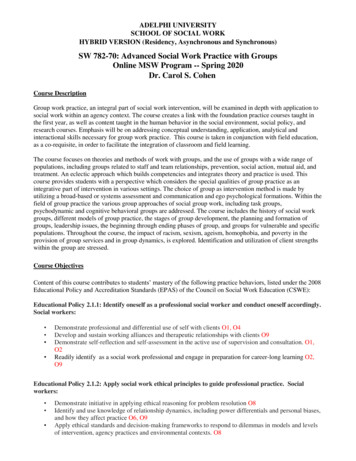
Transcription
ADELPHI UNIVERSITYSCHOOL OF SOCIAL WORKHYBRID VERSION (Residency, Asynchronous and Synchronous)SW 782-70: Advanced Social Work Practice with GroupsOnline MSW Program -- Spring 2020Dr. Carol S. CohenCourse DescriptionGroup work practice, an integral part of social work intervention, will be examined in depth with application tosocial work within an agency context. The course creates a link with the foundation practice courses taught inthe first year, as well as content taught in the human behavior in the social environment, social policy, andresearch courses. Emphasis will be on addressing conceptual understanding, application, analytical andinteractional skills necessary for group work practice. This course is taken in conjunction with field education,as a co-requisite, in order to facilitate the integration of classroom and field learning.The course focuses on theories and methods of work with groups, and the use of groups with a wide range ofpopulations, including groups related to staff and team relationships, prevention, social action, mutual aid, andtreatment. An eclectic approach which builds competencies and integrates theory and practice is used. Thiscourse provides students with a perspective which considers the special qualities of group practice as anintegrative part of intervention in various settings. The choice of group as intervention method is made byutilizing a broad-based or systems assessment and communication and ego psychological formations. Within thefield of group practice the various group approaches of social group work, including task groups,psychodynamic and cognitive behavioral groups are addressed. The course includes the history of social workgroups, different models of group practice, the stages of group development, the planning and formation ofgroups, leadership issues, the beginning through ending phases of group, and groups for vulnerable and specificpopulations. Throughout the course, the impact of racism, sexism, ageism, homophobia, and poverty in theprovision of group services and in group dynamics, is explored. Identification and utilization of client strengthswithin the group are stressed.Course ObjectivesContent of this course contributes to students’ mastery of the following practice behaviors, listed under the 2008Educational Policy and Accreditation Standards (EPAS) of the Council on Social Work Education (CSWE):Educational Policy 2.1.1: Identify oneself as a professional social worker and conduct oneself accordingly.Social workers: Demonstrate professional and differential use of self with clients O1, O4Develop and sustain working alliances and therapeutic relationships with clients O9Demonstrate self-reflection and self-assessment in the active use of supervision and consultation. O1,O2Readily identify as a social work professional and engage in preparation for career-long learning O2,O9Educational Policy 2.1.2: Apply social work ethical principles to guide professional practice. Socialworkers: Demonstrate initiative in applying ethical reasoning for problem resolution O8Identify and use knowledge of relationship dynamics, including power differentials and personal biases,and how they affect practice O6, O9Apply ethical standards and decision-making frameworks to respond to dilemmas in models and levelsof intervention, agency practices and environmental contexts. O8
Identify and address the impact of changing organizations on client outcomes and service delivery. O2Educational Policy 2.1.3: Apply critical thinking to inform and communicate professional judgments.Social workers: Collaborate with clients regarding assessment and intervention strategies, benefits, and consequencesO1, O6Evaluate the strength and weaknesses of multiple theoretical perspectives and differentially apply themto client systems O4Differentially select and implement strategies for assessment & interventions using evidence basedpractice and best practice methods O7Communicate professional assessment to other social workers and to professionals from otherdisciplines in both verbal and written formats O2Educational Policy 2.1.4: Engage diversity and difference in practice. Social workers: Research and apply knowledge of diverse populations to enhance client well-being O3, O4, O7Work effectively with diverse populations, using an understanding of how culture, power, privilege,policies and services impact them O3, O9Educational Policy 2.1.5: Advance human rights and social and economic justice. Social workers: Use knowledge of the effects of oppression, discrimination, and historical trauma on client and clientsystems to guide interventions O8, O9Advocate at multiple levels for the advancement of human rights and social justice O2, O9Educational Policy 2.1.6: Engage in research-informed practice and practice-informed research. Socialworkers: Use the EBP process to inform direct practice O7Use research methodology to evaluate practice processes and outcomes O1, O5Educational Policy 2.1.7: Apply knowledge of human behavior and the social environment. Socialworkers: Draw from multiple sources, theories and models of human behavior and differentially apply thesemodels to guide direct practice O3, O6Educational Policy 2.1.8: Engage in policy practice to advance social and economic well-being and todeliver effective social work services. Social workers: Address policies that challenge and/or support achievement of client goals O2, O9Communicate to stakeholders the implications of policies and policy change to the lives of clients O2,O9Educational Policy 2.1.9: Respond to contexts that shape practice. Social workers: Assess obstacles in organization and community contexts that may thwart client and community wellbeing O2, O3, O9Identify policies that support or compromise service delivery to particular populations or settings, oracross levels of direct intervention O2, O3Demonstrate organizational evaluation skills that enable assessment, correction and strengthening oforganizational performance. O1, O2Educational Policy 2.1.10(a)–(d) Engage, assess, intervene, and evaluate with individuals, families,groups, organizations, and communities. Social workers:2.1.10(a)—Engagement 2Develop culturally responsive therapeutic relationships O3, O6SW 782 -70 Carol S. Cohen, Spring 2020, Online MSW Program Adelphi University School of Social Work
Attend to the interpersonal dynamics and contextual factors that both strengthen and potentially threatenthe working alliance O5, O6 Establish a process that encourages clients to be equal participants in the establishment of treatmentgoals and expected outcomes O1, O62.1.10(b)—Assessment Select and modify appropriate intervention strategies based on continuous assessment O1, O52.1.10(c)—Intervention Identify multilevel strategies for clients, based on empirical evidence, clinical judgment, and clientpreference. O4, O7 Collaborate with other professionals to coordinate service delivery O2, O92.1.10(d)—Evaluation Advanced Practice Behaviors Collaborating with clients, develop and implement plans for monitoring and evaluating interventionsand client progress. O1, O2Competently document the process and progress of work done with or on behalf of clients andincorporate in future practice O2, O5, O8Upon completion of course, students will demonstrate the following knowledge and application of skills inworking with groups:1. Planning, assessment, practice and evaluation of social work practice with groups.2. Agency and organizational impact in developing groups, and the ability to apply negotiation skills includingadvocacy, mediation, interdisciplinary collaboration, and systems change efforts which will lead to provision ofenhanced group services as an essential approach in various settings.3. The impact of diversity i.e. ethnicity, race, religion/spirituality, gender, age, sexual orientation and otherissues on group planning, assessment and intervention.4. A range of theories and group practice models.5. Dynamics and interventions appropriate to the beginning, middle and endings of groups.6. Group dynamics and processes (including leadership and member roles) in planning and implementinginterventions with groups.7. Evidence-based and promising group interventions to identify and build client strengths.8. Values and ethics specific to social work with groups, including those that impact and emerge through thegroup experience.9. Social work role as agent of change, working on connections between group and community practice topromote social justice, equity, and enhance functioning and improve social conditions.Required Texts:Brandler, S. & Roman, C.P. (2016). Group work: Skills and strategies for effective interventions.(3rd Ed). New York: Routledge.Yalom, I. D. & Leszcz, M. (2005). The theory and practice of group psychotherapy. (5th Ed). New York: BasicBooks.(2019-20). Adelphi University School of Social Work Field Education Manual. Available at:www.adelphi.edu (social work field education)3SW 782 -70 Carol S. Cohen, Spring 2020, Online MSW Program Adelphi University School of Social Work
Recommended Texts:Gitterman, A. & Shulman, L. (Eds.). (2005). Mutual aid groups, vulnerable and resilientpopulations, and the life cycle. 3rd Edition. New York: Columbia University Press.Malekoff, Andrew (2014). Group work with adolescents: Principles and practice. 3nd Edition.Gilford Press.Northen, H., & Kurland, R. (2001). Social work with groups (3rd ed.) New York: ColumbiaUniversity Press.Availability of Readings:It is recommended that students purchase required texts. With the exception of chapters in the Required texts,most Required Readings and some Resource Readings are available through the Moodle site for this class, andsome readings can also be accessed through the library either e-reserve or online through article data bases.Journals and Websites:GroupworkInternational Journal of Group PsychotherapySocial Work with Groupswww.iaswg.org International Association for Social Work with GroupsOverview of Student Assignments and Evaluation Criteria in all SectionsStudents will be required to complete assignments that will take the form of written papers, logs, or grouppresentations. This will give students the opportunity to demonstrate their level of mastery of the course content.Class participation in-class demonstrations and class discussions is expected.Criteria used for evaluating students may include performance in such areas as: written assignments (includingdepth of content, clarity of content, accuracy, and research adequacy), exams, class participation, andattendance. Individual instructors will provide students with written notification regarding the specifics of howgrades will be determined in each section of the course.Students’ Graded Assignments and Activities, SW 782-70. Spring 2020, Online MSW Program(Full descriptions appear at the end of the syllabus)1. Preparation for Social Work with Groups and Beginning Phase of Practice (3 IntegratedPapers) 60% of Class Grade (Total for 3 Stages), Each Stage 20%,a. Paper One: Identification and Preliminary Planning for the GroupDue: February 16, 2020b. Paper Two: Stage Two: Contextual Analysis and Crafting the Proposed Plan for the GroupDue: March 8, 2020c. Paper Three: Beginning Phase Implementation and Assessment of the GroupDue: April 5, 20202 & 3. Group Presentation and Reflection Paper30% of Class Grade (includes both presentation and individual paper)Focus: This assignment includes a small group presentation on a topic of interest and an individualreflection paper regarding the process and outcome of the small group experience.Small group presentations will be scheduled on April 16 and April 23, 2020Member Reflection Papers Due May 7, 2020Format: Small group presentations will be 40 to 60 minutes.Paper should be typed, Double Spaced, 1” margin on all sides, paginated.Length of Individual Member Reflection Paper: 3-4 Pages (without cover page or references)4SW 782 -70 Carol S. Cohen, Spring 2020, Online MSW Program Adelphi University School of Social Work
4. Participation and Contribution to the Class Learning Community10 % (for quality of participation in residency, synchronous and asynchronous sessions, and timelysubmissions)Exam Assignment PolicyAdelphi University welcomes diversity in its community, and respects various religious observances. TheUniversity requires that students who anticipate being absent due to their religious observance, will notify theirprofessors at the start of the semester. This will allow the faculty to take these observances into consideration inlight of their course exam and assignment schedules.PlagiarismPlagiarism occurs when one does not give credit to another person’s ideas. It includes lifting paragraphs from abook, article, or the Internet, representing someone else’s work as your own, and failing to acknowledge theideas of another person. Plagiarism and other forms of academic dishonesty are serious offenses. Penalties foracademic dishonesty may include failure for the assignment, failure for the course, and/or dismissal from theprogram.Grading CriteriaStudents are expected to attend all class sessions, complete reading assignments and written assignments asassigned. Active participation in class discussions and class activities is required.Students will be evaluated on the basis of the quality of their written and oral work as this demonstratesappropriate acquisition and application of social work practice skills in supervision and staff development. Thecriteria for evaluation of student’s work are: mastery of course content; critical thinking; organization ofmaterial; writing ability; integration and application of course content to social work; and ability toconceptualize.Graduate Grading Policy – Adelphi University School of Social WorkThe numerical equivalents for letter grades are:A 93 and aboveA- 90-92B 87-89B 83-86B- 80-82C 77-79C 73-76C- 70-72F below 70The nominal definitions of letter grades are:A is awarded for excellent workB is awarded for good workC is awarded for marginal workF is awarded for failing workAn Engaged Learning EnvironmentStudents can expect an engaged learning environment that is accessible to all individualsno matter their learning needs and talents. If you have a disability that may impact your ability to carry outassigned coursework, you are encouraged to contact the staff at the Office of Disability Support Services (DSS),located in Room 310 of the University Center, 516-877-3145, DSS@adelphi.edu. The staff will review yourconcerns and determine, with you, appropriate and necessary accommodations. All information and documentationof disability are confidential. If English is not your first language, please notify the instructor at the beginning ofthe semester.5SW 782 -70 Carol S. Cohen, Spring 2020, Online MSW Program Adelphi University School of Social Work
Adelphi University Code of Academic Honesty"The University is an academic community devoted to the pursuit of knowledge. Fundamental to this pursuit isacademic integrity. In joining the Adelphi community I accept the University’s Statement of Academic Integrityand pledge to uphold the principles of honesty and civility embodied in it. I will conduct myself in accordance withideals of truth and honesty and I will forthrightly oppose actions which would violate these ideals. "The code of academic honesty prohibits behavior, which can broadly be described as lying, cheating, or stealing.Violations of the code of academic honesty will include, but are not limited to, the following:1.2.3.4.5.6.7.8.9.Fabricating data or citationsCollaborating in areas prohibited by the professorUnauthorized multiple submission of workSabotage of others’ work, including library vandalism or manipulationPlagiarism: presenting any work as one’s own that is not one’s ownThe creation of unfair advantageThe facilitation of dishonestyTampering with or falsifying recordsCheating on examinations through the use of written materials or giving or receiving help in any formduring the exam, including talking, signals, electronic devices, etc.Refer to: http://academics.adelphi.edu/policies/honesty.php or Adelphi University’s Undergraduate andGraduate Bulletins6SW 782 -70 Carol S. Cohen, Spring 2020, Online MSW Program Adelphi University School of Social Work
Outline of Sessions by Month (Including Readings, Content and Activities)January 2020: Sessions 1-3Goals by the end of January. Students will understand the scope and purposes of social work with groups, gain abeginning understanding of the elements and dynamics of groups, beginning strategies for group formation,multiple ways of understanding stages of group development, and ability to integrate their previous learning andexperience with group work with a paradigm for practice with groups.January 2019: 4 Residency Sessions over 2 days, and 1 AsynchronousSession1A: Residency1/16/209:00-10:30Room 158 NexusOverview of social work with groups and this courseObjectives/competenciesStructure, content, assignmentsReflections on current group work experience and competence1B: Residency1/16/2010:30-12:00Room 158 NexusGroup Dynamics and Stages of Group DevelopmentDimensions of group dynamicsRelationship of individual to group and group to individualModels and assessment of stages of group development2A: Residency1/18/201:00-3:00Room 158 NexusGroup FormationOptions and decision making in group formationSelf-assessment of skillsIASWG Standards for Social Work Practice with Groups2B: Residency1/18/203:00-5:00Room 158 NexusBeginnings in Group WorkAssessment of contexts for practiceElements of planning model for social work with groupsStrategies for promoting group work3: AsynchronousDue 1/26/20History and theories in social work with groupsValues and legaciesContemporary perspectives and challengesSession 1A. (Residency) Overview of social work with groups and this course1/16/20, 9:00-10:30Required Readings:Brandler, S. & Roman, C.P. (2016). Chapter 2, Value dilemmas in group practice (pp.12-18) In Groupwork: Skills and strategies for effective interventions, 3rd Ed. New York: Routledge.Cohen, C.S., Doel, M. Wilson, Quirke, D., Ring K.A. & Ruwaida Abbas, S. (2012). Global group work:Honouring processes and outcomes. Groupwork, 22(1). 78-98.Cohen, C.S. & Olshever, A. (2013). IASWG Standards for Social Work Practice with Groups:Development, application and evolution. Journal of Social Work with Groups, Special Issue: IASWGStandards for Social Work with Groups: Research, Teaching and Practice. 36 (2/3). 111-129.IASWG (2015) Standards for Social Work Practice with Groups, 2nd Edition. New York: IASWG.7SW 782 -70 Carol S. Cohen, Spring 2020, Online MSW Program Adelphi University School of Social Work
Available at:https://www.iaswg.org/assets/2015 IASWG STANDARDS FOR SOCIAL WORK PRACTICE WITHGROUPS.pdfResource Readings:Malekoff, A. (2007) A flexible organizing framework for group work with adolescents. Social Workwith Groups, 30(3). 85-102.Papell & Rothman, (1980). Relating the mainstream model of social work with groups, grouppsychotherapy and the structured group approach. Social Work with Groups,3. 5-23.Ratts, M.J., Anthony, L. Santos, K.N.T. (2010). The dimensions of social justice model: Transformingtraditional group work into a socially just framework. The Journal for Specialists in Group Work, 35(2).160-168.Toseland, R.W. & McClive-Reed, K.P. (2008). Social group work: International and global perspectives.Social Work with Groups, 32(1/2). 5-13.Yalom, I.D. & Leszcz, M. (2005). Chapter 1, Therapeutic factors, (pp.1-18) and Chapter 2, Interpersonallearning, (pp.19-52). In: The theory and practice of group psychotherapy, 3rd Ed. New York: Basic Books.Vinter, R. D. (1985). An approach to group work practice.In: Sundel, Sundel,M., Glasser F,Sarri, R,. &Vinter, R. (Eds.). Individual change through small groups, 2nd Ed. (pp.3-8). NY: Fr
2 SW 782 -70 Carol S. Cohen, Spring 2020, Online MSW Program Adelphi University School of Social Work Identify and address the impact of changing organizations on client outcomes and service delivery. O2 Educational Policy 2.1.3: Apply critical thinking to
